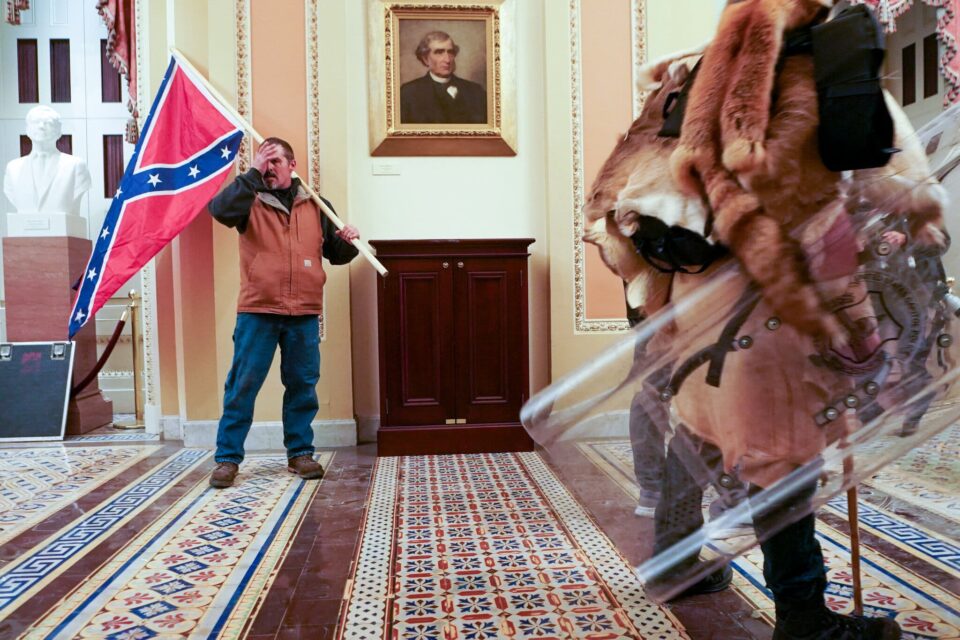Journalists Must Redouble on Spreading Truth
Photographer’s Helmet Cam Captured the Assault
Afterward, He Danced to Lift His Spirits
BET Talks With Sheila Jackson Lee for Jan. 6
NPR’s Cornish: ‘No Malice or Resentment’
Mel Reeves, Activist Journalist, Dies in Minn.
Ben Smith Faces Blowback Over Planned Venture
More Women Accuse Black News Channel
Kristof Ruled Unqualified to Run for Governor
Homepage photo: Kevin Seefried carries a Confederate flag into the Capitol during the Jan. 6, 2021, siege. (Credit: Erin Schaff/New York Times)
Support Journal-isms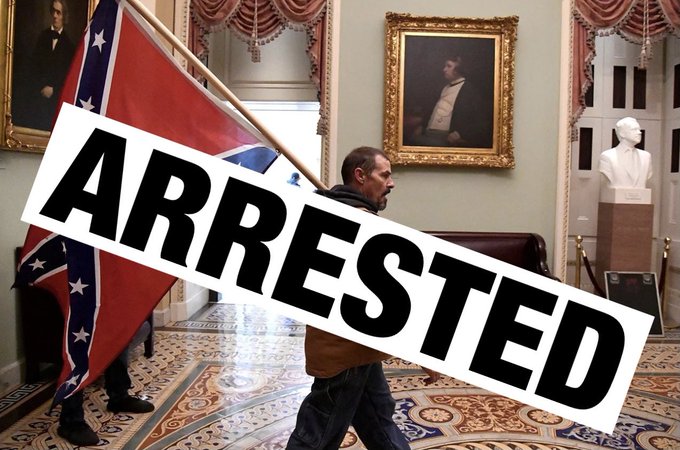
Journalists Must Redouble on Spreading Truth
As the nation focuses on the Capitol insurrection of a year ago and the continuing push to undermine our democracy, some have compared the competing narratives about what took place that Jan. 6 to the Confederate “Lost Cause.”
“I mean, it is something we’ve seen in history before,” Nicole Hemmer, associate research scholar at Columbia University and author of “Messengers of the Right,” said Sunday on CNN’s “Reliable Sources.”
“We saw it at the end of the Civil War, this call for reconciliation between the North and the South and that reconciliation required denying that the South had done anything wrong. And that myth lived in the United States for 100 years.”
David W. Blight, Yale history professor, Pulitzer Prize-winning biographer of Frederick Douglass and authority on the Civil War, spoke in more detail about those parallels a year ago in an interview with Zack Stanton for Politico Magazine. Blight said that “Lost Cause” echo means journalists must “keep finding the truth, writing about it, and spreading it as wide as you can.”
Trumpism is “very similar to the Confederate Lost Cause, and, to some extent, even what gave rise to the Nazis in the 1920s: the German ‘Lost Cause,’ the ‘stab in the back’ theory of World War I [the belief that the Germans didn’t lose the war, but were instead betrayed from within]. They have a set of passionate beliefs — not facts, passionate beliefs. In search of a story — in search of a history, in search of a leader, in search of anything they can attach to — lost causes tend to become these great mythologies whose great conspiracy theories tend to explain everything,” Blight said.
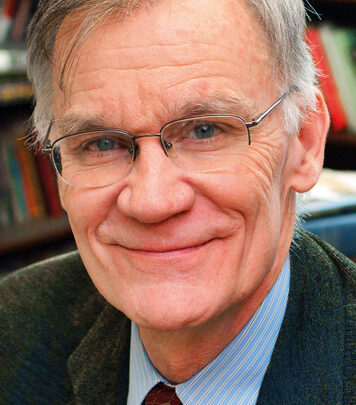 The historian (pictured) also said, “A lot of the analysis of Trumpism is that these people were harboring all kinds of grievances for a long time — about their economic condition, about their sense of displacement in American society, about loss of status, and so on. There is a lot of reality in that that a lot of us liberals and academics don’t always want to face. The Confederate Lost Cause was rooted in some real things: a colossal defeat and tremendous loss — probably 300,000 white Southerners perished in that war — and destruction of their land and economy. It was a collective psychological response to mass trauma.
The historian (pictured) also said, “A lot of the analysis of Trumpism is that these people were harboring all kinds of grievances for a long time — about their economic condition, about their sense of displacement in American society, about loss of status, and so on. There is a lot of reality in that that a lot of us liberals and academics don’t always want to face. The Confederate Lost Cause was rooted in some real things: a colossal defeat and tremendous loss — probably 300,000 white Southerners perished in that war — and destruction of their land and economy. It was a collective psychological response to mass trauma.
“The Trumpian Lost Cause is, at its core, a set of beliefs in search of a history and a story. The question is, how long do these beliefs survive? The stolen election is the biggest of their beliefs, but they’ve got a lot of others: the liberals are coming for your guns, and liberals are coming for your taxes, and the liberals want to plow all your tax money into those cities for the black and brown people, and liberals are going to open up the border and continue this browning of America, and liberals are running the universities and taking them to hell in a hand basket, and so on.
“Trumpism has the ingredients for this. It may depend on how much of a ‘victim’ he becomes. If he’s really victimized, in their view, by the impeachment trial or by prosecutions — if he goes to jail for two years, like Jefferson Davis did — God help us. He could come out the victimized saint of that Lost Cause. Even if it dwindles down to only a few million people, they could be extremely dangerous.
“At the heart of a lost cause, if it has staying power, is its capacity to turn itself into a victory story. . . .”
Stanton asked Blight, “How do you go about combating a ‘lost cause’ mythology? Here we are, 150+ years after the end of the Civil War, and there’s still a degree of that mythology around the Confederacy.”
Blight replied, “Oh, there is indeed, and a lot of us have spent our careers trying to kill it off. It’s like stomping on flowers that come back the next spring or something. I think you can only do what you have the tools to do. In journalism, that means to keep finding the truth, writing about it, and spreading it as wide as you can. In writing and teaching history, you find the evidence, you write good narratives, and you write in a way to reach the broadest public as best you can. . . .”
Photographer’s Helmet Cam Captured the Assault
“On Jan. 6, 2021, Los Angeles Times photographer Kent Nishimura was assigned to cover a pro-Trump rally at the Ellipse, just south of the White House. Then-President Trump railed during the rally at what he falsely claimed was a stolen election and urged his supporters to march on the U.S. Capitol, where the balloting results were being certified,” Nishimura and Mark E. Potts wrote Tuesday for the Times.
 Nishimura (pictured) followed them, documenting the Capitol attack in real time. As he sent in photos and video of the event, he let his GoPro camera, attached to his helmet, run as long as the battery could last. That video had never been shown until now.”
Nishimura (pictured) followed them, documenting the Capitol attack in real time. As he sent in photos and video of the event, he let his GoPro camera, attached to his helmet, run as long as the battery could last. That video had never been shown until now.”
Asked, “What is one photo you took that sticks with you and why?,” Nishimura replied:

“On the morning of Jan. 11, I found myself on the U.S. Capitol grounds before sunrise. I had seen a large influx of National Guardsmen into D.C. and knew that they’d be posted at the Capitol. I made photographs of the troops walking past the Capitol with the iconic dome in the background, and watched as they were each issued a small breakfast box and proceeded to sit on the steps of the House of Representatives, where only a week earlier the plaza was filled with insurrectionists.
“I would later come across troops quartered in the halls of the Capitol. It was such a surreal sight, to see troops quartered on the hard, unforgiving floors. Perhaps the first time this sight was beheld in more than 150 years.
“A plaque near the resting guardsmen commemorated another time when soldiers were quartered in the building: April 15, 1861, at the start of the Civil War. It was a quiet moment that I saw come together as I walked up the spiral staircase of the Small House Rotunda, the lines leading my eyes to the sleeping guardsmen: a grim yet poignant reminder of what had happened only a week earlier.”

Afterward, He Danced to Lift His Spirits
“Last Jan. 6, photographer Mel D. Cole (pictured, below) had only recently turned his lens from musical events to political ones,” Char Adams reported Wednesday for NBC BLK.
“That day, he simply planned to capture President Donald Trump’s rally near the White House. He had no idea how the day would unfold.
“His compelling images show rioters struggling with police, tending to their pepper-sprayed eyes, forcing their way into the Capitol and dragging an officer down the building’s steps.
 “ ‘In no way, shape or fashion did I expect people to do what they did that day,’ he said. ‘Some people got in [to the Capitol], there were fights, there was craziness. It was the craziest day of my entire life.
“ ‘In no way, shape or fashion did I expect people to do what they did that day,’ he said. ‘Some people got in [to the Capitol], there were fights, there was craziness. It was the craziest day of my entire life.
“Cole remembers feeling panic set in as the rioters made their way to the Capitol after Trump’s speech at the rally.
“ ‘Walking down to the Capitol building,’ he said, ‘that’s when I started to fear for my life.’
“The pro-Trump mob descended on the Capitol that day, many with weapons and Confederate flags, emboldened by Trump’s instruction to flock to the building just moments before. Cole, 45, said he was among about five photographers there, and one of a handful of Black people — though the others were likely Trump supporters, he said.
“After taking photos of the rioters swarming the Capitol, Cole said he knew he had to leave when he saw police working to control the situation with flash-bang grenades, tear gas and more pepper spray.
“Before the rally, Cole had spent 2020 documenting Black Lives Matter protests where, he said, he’d been punched in the face, arrested and beaten by police. But nothing could compare to the ‘traumatic’ riot at the Capitol, he said. Cole went home that day and shared his experience on Instagram, shedding tears and dancing. Anything, he said, to lift his spirits.
“ ‘It wasn’t therapy in the sense of what therapy is. But, for me, it was therapeutic hearing people tell me I’m loved and that what I’m doing is amazing,’ Cole said. ‘It kept me motivated.’ . . . ”
- Evette Alexander, Knight Foundation: New survey of 4,000 Americans: We agree that free speech is important, but disagree on what’s acceptable post-2020
- Marc Ambinder, MSNBC: ‘Fake News’ Can’t Be Fixed by More Journalism, Not When Our Democracy Is Broken (Dec. 26)
- Farnoush Amiri, Associated Press: ‘Hatred in the eyes’: How racist rage animated Jan. 6 riots (Jan. 7)
- Perry Bacon Jr., Washington Post: We may have already missed our last, best chance to bolster American democracy (Dec. 1)
- Joshua Benton, Nieman Lab: Is “resistance journalism” about practices or power?
- Stacy M. Brown, National Newspaper Publishers Association: Will the Commission Conclude that Trump Was Negligent in Jan. 6 Insurrection?
- Jarvis DeBerry, Louisiana Illustrator: As Trump’s mob ransacked the Capitol, a Confederate flag was the least surprising sight (Feb. 12, 2021)
- Karen Dunn and Roberta A. Kaplan, Washington Post: White supremacists are using an old playbook but so are the lawyers fighting them (Dec. 28)
- Robin Givhan, Washington Post: Memorializing anger and ignorance
- Amy Goodman, “Democracy Now!”: “White Rage” Author Carol Anderson: GOP Attack on “Election Fraud” Really an Attack on Black Voters
- Renée Graham, Boston Globe: Jan. 6 was not a riot. It was an insurrection.
- Colbert King, Washington Post: The truth in 2022 is our strongest weapon against the lies that fed the insurrection
- Media Matters for America: January 6 Insurrection (several stories)
- Josh Meyer and Kevin Johnson, USA Today: From Oklahoma City to Jan. 6: How the US government failed to stop the rise of domestic extremism (Dec. 30)
- Aaron Morrison, Associated Press: The AP Interview: Nikole Hannah-Jones’ warning on democracy (Dec. 28)
- Andrés Oppenheimer, Miami Herald: If we’ve learned nothing else from 2021, it’s that we cannot allow democracy to die (Dec. 24)
- Gretchen A. Peck, Editor & Publisher: At the front lines, on the homefront — Domestic extremism deserves astute, relentless coverage, but there are few journalists on the beat
- Leonard Pitts Jr., Miami Herald: Jan. 6 rioters do not love America. They hate — and fear — the America we’re becoming
- Eugene Robinson, Washington Post: If we are to save our democracy, there must be a reckoning for the Jan. 6 attack
- Craig Silverman, Craig Timberg, Jeff Kao and Jeremy B. Merrill, Washington Post and Pro Publica: Facebook groups topped 10,000 daily attacks on election before Jan. 6, analysis shows
- Kimberly Atkins Stohr, Boston Globe: A year after a seditious insurrection, why won’t federal prosecutors treat it that way?
- Margaret Sullivan, Washington Post: If American democracy is going to survive, the media must make this crucial shift
- Stuart A. Thompson, New York Times: Election Falsehoods Surged on Podcasts Before Capitol Riots, Researchers Find
- Helen Ubiñas, Philadelphia Inquirer: On the anniversary of the Jan. 6 insurrection, an urgent call to save our country
- Erik Wemple, Washington Post: Sean Hannity’s bottomless corruption
- Michael Paul Williams, Richmond (Va.) Times-Dispatch: When extremism is the norm, democracy is imperiled (Dec. 22)

BET Talks With Sheila Jackson Lee for Jan. 6
On Jan. 6, 2021, now being characterized as another “day that will live in infamy,” the major television networks broadcast the shocking images of overwhelmingly white militants storming the U.S. Capitol, but Black Entertainment Television and TV One, two major Black-oriented networks, were showing their usual fare.
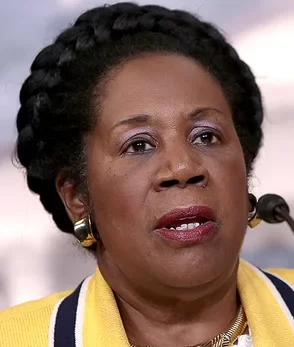 For BET, that was “Tyler Perry’s Assisted Living,” for TV One it was “Family Matters: We’re Going to Walt Disney World.”
For BET, that was “Tyler Perry’s Assisted Living,” for TV One it was “Family Matters: We’re Going to Walt Disney World.”
A year later, as the anniversary was Topic A for so many news organizations, Journal-isms asked both networks their plans.
TV One spokesperson Nyree Wright messaged, “TV One had no plans regarding January 6th anniversary.”
Luis deFrank, a spokesperson for BET, said, “We do not have any linear special scheduled to air today. We have been tracking this story and anniversary on BET.com/News.
“The team just published an exclusive interview with Rep. Sheila Jackson Lee (pictured) recounting her experience during the Capitol insurrection. You can share the story link with your readers. . . . “
Meanwhile, Black News Channel tweeted, “BNC is bringing you in-depth coverage of the #January6 insurrection. On-air and online you can view our panel discussions, expert insight, and BNC talent all shedding light on the impact and aftermath of the #CapitolRiot.”
- Tom Jones, Poynter Institute: Media coverage of the somber anniversary of Jan. 6
NPR’s Cornish: ‘No Malice or Resentment’
As some called attention to the departure of notable people of color from NPR, prompted by the announcement Tuesday by “All Things Considered” co-host Audie Cornish (pictured) of her impending exit, Cornish took to Twitter to clarify.
She tweeted Thursday:
 “It seems my assumption that I would have a quiet transition was naïve. So I will attempt to provide whatever insight I can… using language the internet understands lol
“It seems my assumption that I would have a quiet transition was naïve. So I will attempt to provide whatever insight I can… using language the internet understands lol
“Every single word of my announcement is true. I am leaving of my own accord with no malice or resentment. I have had a great run with a company full of people I respect and admire. And I am ready to try something new.
“I also understand that 4 hosts leaving in a year – three of them POC women– is a red flag as my co host
@arishapiro underscored earlier this week. I appreciate him taking it upon himself to raise it.
“I can’t speak for all POC – but I want to be clear. I do not have to. Our experiences at the company vary and there are some common threads. A number of people have been waving their hands in the air trying to draw attention to them. check the threads. they are not hiding!
“Moreover some of these issues permeate the public media system – yes stations AND yes your favorite podcast companies that have sprung from that system. While the media reporting on this has been to treat each as a problem in isolation that is not the case.
“My path through public media and frankly journalism has of course not been all roses. There have been many many times when I was the only person of color ‘on the campaign bus’ ‘at the press conference’ ‘at the table’ ‘on the sunday show’ and all that entails.
“Over the years that has changed and for the better! There are many amazing talented black and brown people in front of the camera/mic, in high profile gigs, are executives and more.
“The flipside is that plenty of voices are speaking out about the work that still needs to be done. Call them! Yes this is for you media reporters. It’s also for public media managers, podcast companies and news media companies dipping into audio.
“Trust, you have the same issues brewing (pay equity, cultural exclusion, problems of recruitment and retention). You are not immune and you are not doing all that much better. #NPR #podcasts
“The people who are speaking out are not ‘trouble makers’. They care deeply about the companies where they work. They WANT to stay. They want to make things better.
“In the meantime I gotta take care of these little kids for a bit. Throw some snow balls. Prepare to announce what I have in store next. It’s a good thing. promise.”
- Paul Farhi and Elahe Izadi, Washington Post: NPR is losing some of its Black and Latino hosts. Colleagues see a larger crisis
- Katie Robertson, New York Times: Audie Cornish, host of ‘All Things Considered,’ is leaving NPR.
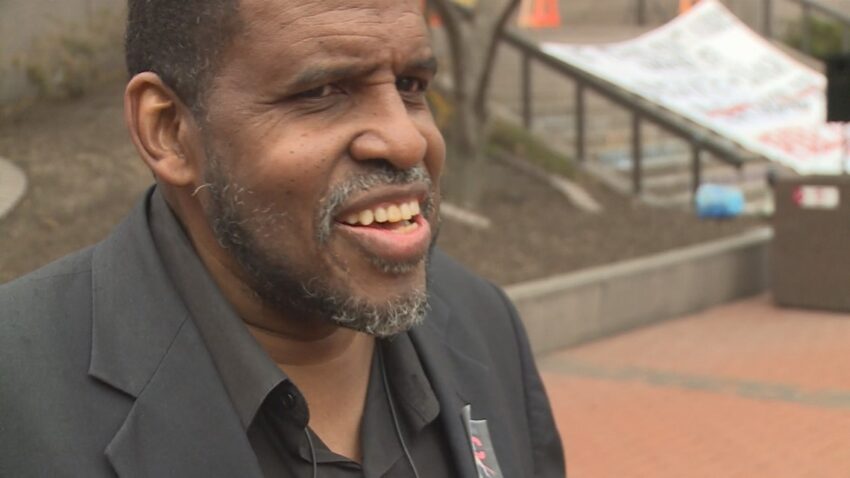
Mel Reeves, Activist Journalist, Dies in Minn.
“Mel Reeves, a Minneapolis civil rights activist and writer who spent decades fighting for social justice, has died from complications of COVID-19,” Abby Simons and Randy Furst reported Wednesday for the Star Tribune.
“Reeves’ death was announced by the Minnesota Spokesman Recorder, a longtime Black newspaper where Reeves served as community editor and frequently penned articles.”
The Spokesman Recorder quoted Jerry Freeman, MSR’s senior editor, and a colleague since the mid-1990s: “Mel was a writing machine; it just poured out of him. He always had an intelligent, conscientious, well-thought-out understanding of what was happening. He was a fighter for justice who cared about the underdog. He was always thinking about who we need to stand up for.”
Simons and Furst continued, “Reeves, 64, was a fixture at protests and civic events, where he was an outspoken advocate for marginalized communities. He was open about his battle with COVID-19, posting photos of himself in the hospital. Just last week he gave an interview to WCCO-TV about the ravages of the virus and urged people to get vaccinated. In the interview, Reeves said he wasn’t vaccinated because of an issue with blood clots, but was now eligible.
” ‘This thing is serious. Folks got to take this serious, people are literally dying,’ he told WCCO.
“News of Reeves’ death was immediately met with widespread online tributes. . . .”
- Alexandra Simon, KARE, Minneapolis: Reporter, Twin Cities community activist Mel Reeves dies from COVID-19
Ben Smith Faces Blowback Over Planned Venture
Ben Smith (pictured, below), the former BuzzFeed editor who has broken media stories in the New York Times as a “Media Equation” columnist, is facing blowback over his announcement Tuesday that he is leaving the Times to start a loosely defined global news organization with Justin Smith, Bloomberg Media CEO.
 Axios published a statement from Justin Smith announcing the new venture’s goals:
Axios published a statement from Justin Smith announcing the new venture’s goals:
“A new, English-speaking, college-educated global audience has emerged across the globe. Henry Luce launched Time in 1923 after identifying a new national community: millions of Americans with college degrees, curious about the world, and living busy lives. Today, the mobile internet and the rise of international higher education have created an English-speaking, college-educated, professional class of over 200 million people. . . .”
Writing for the Poynter Institute, once laid-off BuzzFeed writer Alex Sujong Laughlin observed, “In 2021, just 2.2% of all venture funding went to companies with female founders and 1.2% went to Black founders, Crunchbase reports. In the first half of the year, just .34% of venture funding went to companies with Black female founders. It’s not because these founders are any less worth investing in.”
Laughlin quoted Gabe Schneider, “the editor and co-founder of The Objective, a nonprofit newsroom focused on media reporting and criticism that holds the industry accountable for systemic biases.”
“ ‘I wonder if (Ben Smith) thought about the power dynamics at play when he decided to announce it in this way, without a concept in mind,’ Schneider said. ‘It’s not about them. It’s about the systemic barriers in place when you’re trying to build a news outlet, particularly when you’re from a background that you might not look like other news founders.’ “
 Rob Capriccioso (pictured, by Marty Two Bulls Sr.), a Native American journalist who just launched his Indigenous Wire site, was the first wire editor for Politico, where Ben Smith worked and became editor.
Rob Capriccioso (pictured, by Marty Two Bulls Sr.), a Native American journalist who just launched his Indigenous Wire site, was the first wire editor for Politico, where Ben Smith worked and became editor.
“Global news does sound like it could and should include Indigenous news, though, right?” Capriccioso wrote Wednesday.
“As a Twitter follower told me yesterday, after reading my intro post in which I talked about the longtime difficulty of getting Native voices into mainstream newsrooms: ‘World out there [is] hungry for Indian (sic) country news.’
“I agreed and asked, ‘Are we (Native journalism) part of the growing streaming, cultural and political trends, or not?’
“I, of course, fervently believe we are, so why wouldn’t we be included in a new global media empire the likes of which Ben is planning?”
And Anna Nicolaou of the Financial Times quoted Ben Smith on diversity: “You’ll have to judge us by our hiring and the content. But you know, we aim to . . . hire magnificent journalists who are connected to audiences all over the world. And that’s going to have to be representative.”
- Clare Malone, New Yorker: Ben Smith Can’t Say What His New Media Venture Is
More Women Accuse Black News Channel
More women came forward Tuesday to lodge gender-discrimination accusations against Black News Channel, now branding itself as BNC. They bring the plaintiffs to 13.
In addition to original plaintiffs Ashley Flete, a former anchor who first filed suit with Claudia Jean last August (scroll down), “the other plaintiffs include . . . executive producer Maria Roach, newsroom executive Felicia Burton, director Lauren Coleman, line producer Kyra Branch and part-time assignment editor Kisha Wilkinson; six additional plaintiffs are listed as ‘Jane Doe’ on the complaint. Only Branch and one unnamed plaintiff are still working at BNC; all others were either fired or resigned,” Antoinette Siu reported Wednesday for The Wrap.
The network announced layoffs right before Christmas, leading Scott Jones of the FTVLive website to write, “It is getting to the point where Black News [Channel] might have as many lawsuits against them as they do viewers that watch them.” Jones published a portion of Tuesday’s filing in Cook County (Ill.) Circuit Court.
The network issued this statement Thursday:
“Unprofessional and inappropriate conduct within our workplace environment is not tolerated. We take these matters seriously and have policies in place that prohibit all forms of unlawful behavior, as well as other conduct that is incompatible with our company values. We have investigated each of these claims thoroughly and will soon be filing our motion to dismiss based on several grounds. In addition, we are pursuing multiple actions related to the plaintiffs’ counsel’s pattern of ethical misconduct and are looking forward to our day in court.”
University students have competed to accompany Nicholas Kristof on reporting trips to cover global poverty and social justice issues. (New York Times video)
Kristof Ruled Unqualified to Run for Governor
Nicholas Kristof, a former New York Times columnist who wrote passionately about inequality, does not qualify to run for governor of Oregon this year because he failed to meet the state’s three-year residency requirement, state officials announced on Thursday,” Mike Baker reported Thursday for the Times.
“Secretary of State Shemia Fagan said the decision came after the agency reviewed the voting and taxpaying history of Mr. Kristof, including his registration as an Oregon voter in December 2020 after having been previously registered in New York. . . . Kristof said that he planned to challenge the decision in court and that he was confident he would prevail. . . “
When Kristof announced his decision to run in October, and left the Times, he said, “This has been my dream job, even with malaria, a plane crash in Congo and periodic arrests abroad for committing journalism. Yet here I am, resigning — very reluctantly.”
In May 2021, reflecting on the murder of George Floyd, Kristof wrote, “We in the commentariat have leapt at covering police violence against Black citizens since George Floyd’s murder a year ago, but I don’t think we’ve been as good at responding to other inequities that cost a far greater number of lives.
“Even if Floyd hadn’t been murdered, he still very likely would have died prematurely because of his race.
“There would have been no headlines, no protests, no speeches. But the average Black man in America lives about five fewer years than the average white man. A newborn Black boy in Washington, D.C., has a shorter life expectancy than a newborn boy in India.
“One of the challenges for those of us in journalism is to do a better job highlighting these inequities that don’t come with a viral video. . . .”
Support Journal-isms
To subscribe at no cost, please send an email to journal-isms+subscribe@groups.io and say who you are.
Facebook users: “Like” “Richard Prince’s Journal-isms” on Facebook.
Follow Richard Prince on Twitter @princeeditor
Richard Prince’s Journal-isms originates from Washington. It began in print before most of us knew what the internet was, and it would like to be referred to as a “column.” Any views expressed in the column are those of the person or organization quoted and not those of any other entity. Send tips, comments and concerns to Richard Prince at journal-isms+owner@
View previous columns (after Feb. 13, 2016).
View previous columns (before Feb. 13, 2016)
- Diversity’s Greatest Hits, 2018 (Jan. 4, 2019)
- Book Notes: Is Taking a Knee Really All That? (Dec. 20, 2018)
- Book Notes: Challenging ’45’ and Proudly Telling the Story (Dec. 18, 2018)
- Book Notes: Get Down With the Legends! (Dec. 11, 2018)
- Journalist Richard Prince w/Joe Madison (Sirius XM, April 18, 2018) (podcast)
- Richard Prince (journalist) (Wikipedia entry)
- February 2018 Podcast: Richard “Dick” Prince on the need for newsroom diversity (Gabriel Greschler, Student Press Law Center, Feb. 26, 2018)
- Diversity’s Greatest Hits, 2017 — Where Will They Take Us in the Year Ahead?
- Book Notes: Best Sellers, Uncovered Treasures, Overlooked History (Dec. 19, 2017)
- An advocate for diversity in the media is still pressing for representation, (Courtland Milloy, Washington Post, Nov. 28, 2017)
- Morgan Global Journalism Review: Journal-isms Journeys On (Aug. 31, 2017)
- Diversity’s Greatest Hits, 2016
- Book Notes: 16 Writers Dish About ‘Chelle,’ the First Lady
- Book Notes: From Coretta to Barack, and in Search of the Godfather
- Journal-isms’ Richard Prince Wants Your Ideas (FishbowlDC, Feb. 26, 2016)
- “JOURNAL-ISMS” IS LATEST TO BEAR BRUNT OF INDUSTRY’S ECONOMIC WOES (Feb. 19, 2016)
- Richard Prince with Charlayne Hunter-Gault, “PBS NewsHour,” “What stagnant diversity means for America’s newsrooms” (Dec. 15, 2015)
- Book Notes: Journalists Follow Their Passions
- Book Notes: Journalists Who Rocked Their World
- Book Notes: Hands Up! Read This!
- Book Notes: New Cosby Bio Looks Like a Best-Seller
- Journo-diversity advocate turns attention to Ezra Klein project (Erik Wemple, Washington Post, March 5, 2014)
When you shop @AmazonSmile, Amazon will make a donation to Journal-Isms Inc. https://t.co/OFkE3Gu0eK
— Richard Prince (@princeeditor) March 16, 2018

